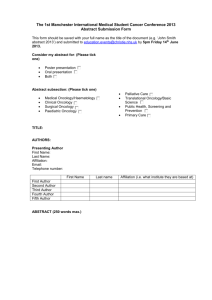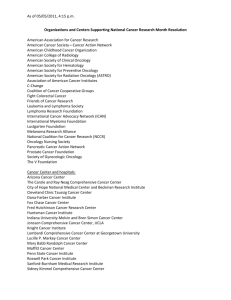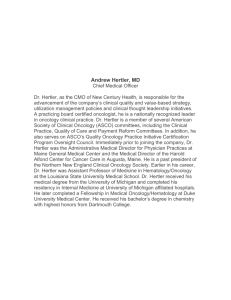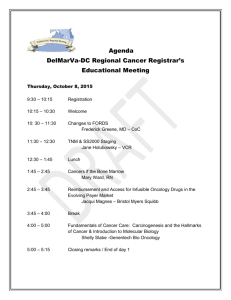oxford deanery specialty training programme in immunology
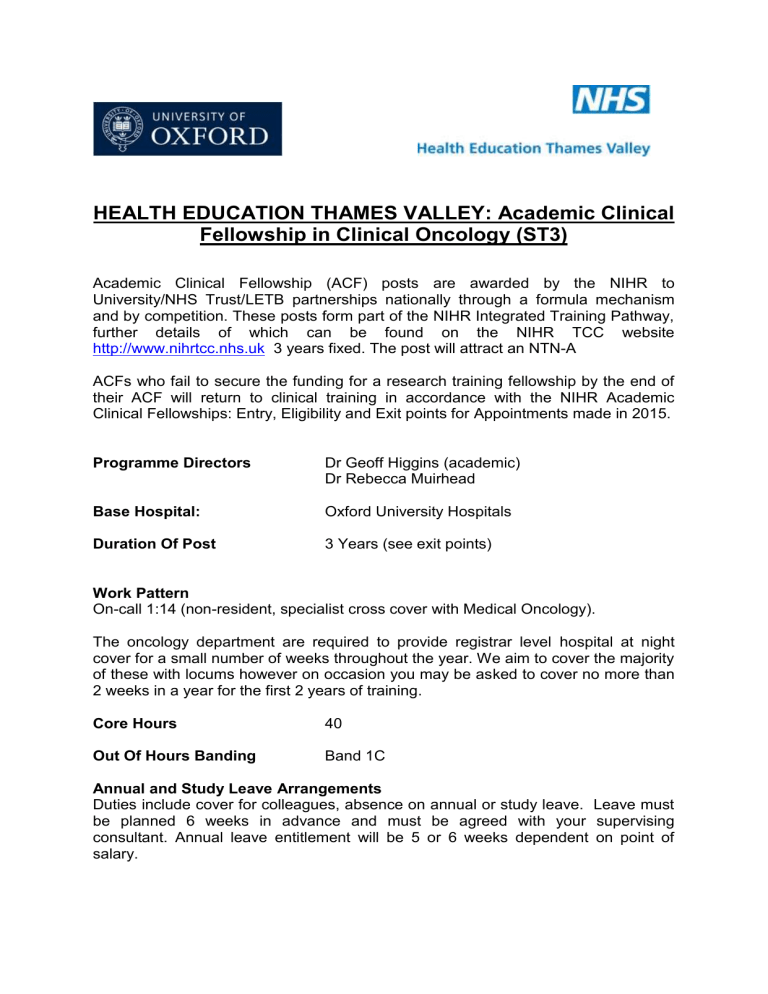
HEALTH EDUCATION THAMES VALLEY: Academic Clinical
Fellowship in Clinical Oncology (ST3)
Academic Clinical Fellowship (ACF) posts are awarded by the NIHR to
University/NHS Trust/LETB partnerships nationally through a formula mechanism and by competition. These posts form part of the NIHR Integrated Training Pathway, further details of which can be found on the NIHR TCC website http://www.nihrtcc.nhs.uk
3 years fixed. The post will attract an NTN-A
ACFs who fail to secure the funding for a research training fellowship by the end of their ACF will return to clinical training in accordance with the NIHR Academic
Clinical Fellowships: Entry, Eligibility and Exit points for Appointments made in 2015.
Programme Directors Dr Geoff Higgins (academic)
Dr Rebecca Muirhead
Base Hospital:
Duration Of Post
Oxford University Hospitals
3 Years (see exit points)
Work Pattern
On-call 1:14 (non-resident, specialist cross cover with Medical Oncology).
The oncology department are required to provide registrar level hospital at night cover for a small number of weeks throughout the year. We aim to cover the majority of these with locums however on occasion you may be asked to cover no more than
2 weeks in a year for the first 2 years of training.
Core Hours 40
Out Of Hours Banding Band 1C
Annual and Study Leave Arrangements
Duties include cover for colleagues, absence on annual or study leave. Leave must be planned 6 weeks in advance and must be agreed with your supervising consultant. Annual leave entitlement will be 5 or 6 weeks dependent on point of salary.
About Health Education Thames Valley
We are the Local Education and Training Board (LETB) for Thames Valley covering
Berkshire, Buckinghamshire and Oxfordshire. Our vision is to ensure the delivery of effective workforce planning and excellent education and training to develop a highly capable, flexible and motivated workforce that delivers improvements in health for the population of Thames Valley.
Thames Valley LETB is responsible for the training of around 2000 Foundation and Specialty trainees.
Health Education Thames Valley is a relatively small organisation with a defined geographical area which serves as a single unit of application. In the majority of cases successful candidates will be asked to preference their choice of location for either one or two years. Some programmes will require successful candidates to indicate a location and specialty. Future placements will usually be based on individual training and educational needs.
Please note that applications are to the
Health Education Thames Valley as a whole. This may mean that you may be allocated to any geographic location within the deanery depending on training needs.
During the 3 year ACF programme, the successful candidate will be largely based in
Oxford but may be partly allocated to other geographical locations depending upon training requirements.
TRAINEE CENTRED CLINICAL TRAINING PROGRAMME
The Clinical Oncology academic training programme is a 3 year programme, starting at ST3. During this time, the trainee's work will be monitored for satisfactory progress and subject to annual reviews in the form of ARCPs. Progression on the programme will be dependent upon these reviews.
The posts on this rotation have been approved for Specialist Training by the Royal
College of Radiologists. The posts attract National Training Numbers and provide training towards a Certificate of Completion of Training (CCT).
The Postgraduate Dean has confirmed that this post has the necessary educational and staffing approvals.
Rotation Information
Rotations may at times change in response to clinical need from the Trusts.
Expected rotation arrangements for this programme are:
The three year training scheme is divided into 5 clinical, and 2 research attachments, see appendix 1.
The timetable of attachments will be drawn up by the Training Programme Director, on behalf of the Educational and Training Committee, and only implemented following approval by the Clinical Director of each Cancer Centre.
TRAINEE CENTRED RESEARCH TRAINING PROGRAMME
The Cancer Research UK and Medical Research Council Oxford Institute for
Radiation Oncology at the Department of Oncology is the world’s leading centre of excellence for radiation oncology and biology research and will provide the ACF with an ideal environment to begin their academic career. The ACF programme has been designed to support the ACFs clinical requirement to pass FRCR examinations, whilst academically they will be offered a comprehensive range of research projects to choose from, in order to allow them to develop their own academic interests.
The ACF will undertake a total of nine months of research. The first three-month block of research will be undertaken at the start of the rotation and will allow the successful candidate to rotate through several different research groups within the
Institute. This will allow them to identify their own areas of interest, develop relevant laboratory skills, and select which research group they would like to work with for the second research block. The research undertaken at the Institute covers all aspects of Radiation Oncology research, from in vitro and in vivo laboratory based research, through to physics, functional imaging and technical radiotherapy research. A summary of the main research groups can be found at http://www.rob.ox.ac.uk/research .
Having selected which research group they wish to work with, and identified the project they wish to work on, the ACF will undertake the second (six month) block of research towards the end of the second year. Practically, the ACF will do a focused project, much like a BSc student during which time they will acquire a broad range of research skills. A secondary aim is for the ACF to become involved in projects that lead to publication. This research interval will be directed towards developing a research proposal that will form the basis of a subsequent DPhil project and enable them to write a competitive Clinical Training Fellowship application. The supervisor and ACF will be aware of the timelines for applications. Key preparatory work for a
Fellowship application includes writing Ethics applications and animal licences, developing collaborative links with clinicians and scientists (e.g. to ensure access to samples, techniques and reagents). Department administrative staff will provide costings and support for these applications.
If the ACF already holds a PhD then support for appropriate post-doctoral research and funding applications will be given.
The ACF will be required to promptly pass the FRCR Part 1 examinations. Institute for Radiation Oncology researchers will provide the ACF with additional exam support by supplementing the FRCR teaching with tutorials, and encouraging attendance at relevant lectures from our Radiobiology MSc course. During the first
12 months, the ACF will be exposed to activities of the host groups by a) attendance at weekly Department meetings where groups present aspects of their work, b) discussions with their academic mentor who will arrange meetings with potential supervisors, c) attendance at laboratory meetings of individual supervisors and d)
meetings with research group members especially other Clinical Training Fellows.
We expect the choice of research group will also be informed by the clinical interest developed by the ACF in the first 6-12 months of clinical training.
Dr Geoff Higgins will act as Academic Programme Lead and provide clinical and academic advice to the ACFs. He will act to support the ACFs and swiftly resolve any unexpected difficulties that the trainee may experience. There is a strong desire both within the Institute for Radiation Oncology, and from the Training Programme
Director for the ACF programme to be successful, and to provide future leaders in academic clinical oncology.
Good library facilities are available at the John Radcliffe Hospital and at other libraries in the Central Oxford Hospitals. The Churchill Hospital Library is based in the Old Road Campus Research Building.
Selection of ACFs
Candidate selection is vital. The Training Panel will ensure potential ACFs have requisite clinical skills and a strong academic record (usually one of the following: 1st
Class Honours Degree, publication record and academic prizes) and a clear desire to embark on a dual academic/clinical career.
Supervision and Mentorship
The ACF will have a separate clinical and academic mentor. The ACF will formally meet both mentors every six months to review progress. Moreover, the group head of the host laboratory will supervise the research project and help the ACF write the
Clinical Training Fellowship application. Where the supervisor is a non-clinical scientist, a clinician scientist will be a second supervisor. Conversely, if the proposed supervisor is primarily a clinician, a clinical academic will be a second supervisor.
Most group heads have supervised clinical trainees previously.
Milestones
Obligatory milestones are a) The ACF must chose a host group by the end of year 1 in order that the relevant group head can ensure space is available to host the ACF, b) A Clinical Training Fellowship application will be submitted by November 2016, c)
The FRCR part 1 will be completed no later than the second available sitting (and preferably at the first available sitting) and d) Clinical performance will be monitored and subject to annual reviews in the form of ARCPs.
Exit from the Programme a) Successful application for a Clinical Training Fellowship. b) Transfer to clinical training should core academic/clinical milestones not be met or if the candidate is unsuccessful in obtaining a Clinical Training Fellowship.
The Department of Oncology
The Department of Oncology within the Medical Sciences Division was created in
October 2010, under the headship of Professor Gillies McKenna. The aims of the
Department include the development of truly multidisciplinary and collaborative oncology research in Oxford. Working closely with colleagues in the new state-ofthe-art NHS Oxford Cancer Centre, research can be rapidly and efficiently translated into cutting-edge clinical treatment for cancer patients. The Department incorporates
the Cancer Research UK and Medical Research Council Oxford Institute for
Radiation Oncology, as well as a number of internationally recognised research groups working in oncology and related fields.
Currently the Department has activities on four sites in Oxford these are the Old
Road Campus Research Building, the Weatherall Institute of Molecular Medicine, the
Radiobiology Research Institute, and in the Oxford Cancer Hospital.
The University of Oxford
’s Department of Oncology has over 400 staff and more than
120 graduate students, and is one of the largest departments in the Medical
Sciences Division. The Department of Oncology also hosts the CR-UK Cancer
Research Centre and the EPSRC/CR-UK-funded Oxford Cancer Imaging Centre.
For more information please visit: http://www.oncology.ox.ac.uk
The Oxford Cancer Research Centre
In 2010, the Cancer Research-UK Oxford Cancer Research Centre was established.
This collaboration between the University and Oxford University NHS Trust encompasses all those involved in cancer research across both organisations and includes over 160 Principal Investigators. The Oxford Cancer Research Centre supports the activities through prestigious Research training fellowships, a development fund and core infrastructure support. In our future plans, this will become the main funder for the translational pipeline in Oxford including the support of staff involved in the design and development of the early phase trials portfolio.
The CRUK/MRC Oxford Institute for Radiation Oncology
The Institute for Radiation Oncology and Biology was established in 2008 with the purpose of creating a centre of excellence for radiation research in the UK. The
Institute, under the Directorship of Professor Gillies McKenna, includes 17 research groups with more than 200 staff and students, of whom the majority are scientists, clinicians and technologists. The research facilities of the Institute are on the Old
Road Campus, adjacent to the Oxford University Hospitals Trust main Cancer
Hospital. Co-located on the Campus are the Wellcome Trust Centre for Human
Genetics, the Ludwig Institute, the Jenner Institute for Vaccine Research, the
Institute for Biomedical Engineering and the Richard Doll Building for Epidemiology and Biostatistics. The Nuffield Department of Medicine has developed a Target
Discovery Institute on this site and the Kennedy Institute of Rheumatology has just opened a new building.
The CRUK/MRC Oxford Institute for Radiation Oncology and Biology is the leading centre for the identification and development of new approaches to the biological and physical targeting of radiation to improve the cure and control of cancer. Our priority areas for application of radiotherapy are lung cancer, gastrointestinal tract notably pancreas and rectal cancer and urology.
For more information please visit: http://www.rob.ox.ac.uk/
TRUST INFORMATION
The Department of Clinical Oncology in Oxford
The Department, based on the Churchill campus of the Oxford University Hospitals
NHS Trust, is the largest of the 3 Radiotherapy Departments of the former Oxford
Region.
The Oxford University Hospitals Trust is a major Teaching Centre, linking with
Oxford University Clinical School and Oxford Brookes University’s School of Health
Care Studies. The Hospital is based on three main sites: The John Radcliffe, the
Churchill in Headington, and the Horton in Banbury.
The Department in Oxford, serves a population of approximately 1.4 million, which includes Oxford, Banbury, Aylesbury, South Bucks (High Wycombe and Amersham),
Milton Keynes and Swindon. Peripheral clinics are held regularly in the District
Hospitals and are staffed principally by the Consultant responsible for that clinic and
Specialist Trainees, details in appendix 2.
The new Oxford Cancer Centre opened in 2009, with brand new facilities for patients in the region, including two oncology wards, outpatient facilities, a newly built radiotherapy area as well as surgical wards and an on-site ITU. There is also a small private wing attached to the Centre.
Within the Oxford Department, general and site specialist clinics are conducted by all the Consultants. Oxford has developed site-specialist working in line with the
Calman-Hine recommendations. The combined clinics cover the following site specialist areas:-
Breast
Head and Neck
Lung
Dermatology
Gastro-intestinal tract
Brain/CNS
Urology
Musculo-skeletal
Gynaecology
Endocrine
Haematology
Paediatrics
The Department receives over 3,400 new referrals each year and provides patients with comprehensive care, to include full assessment and treatment by both irradiation and /or chemotherapy, as appropriate.
Patients requiring ward admission are admitted to the Oncology ward, which contains 22 acute beds. There is also a Short Stay ward, for planned chemotherapy admissions and planned procedures requiring admission.
Cytotoxic chemotherapy is administered in the Chemotherapy Suite on an outpatient basis. The Trust also operates a nurse led Triage Service within the oncology ward system.
Oxford Equipment
Within the Department there is a full range of equipment, including:
Six Varian Linear Accelerators, four of which have on board cone-beam CT 3 currently have rapid arc capability. We also have an exactrac system currently in use for brain radiosurgery and stereotactic treatments. Of radical patients, we treat 10% with standard conformal treatment, 40% of patients with IMRT/Rapidarc, and the remaining 50% of our patients are breast cancer patients treated with forward planned IMRT. IGRT is used routinely in all patients. SABR to primary lung and oligometastatic disease is delivered routinely.
Treatment planning is undertaken in a new planning suite using either CT simulation and Eclipse or with our Acuity Simulator with CT facility.
The Department has an interest in brachytherapy. Intra-cavitary caesium treatments are carried out using Varian PDR brachytherapy equipment.
ARIA patient information, scheduling system and verification systems.
The Churchill Hospital is served by an on-site Radiology Department, which includes
Ultrasound, Nuclear Medicine and CT and MRI and PET scanning.
Links with other Specialist Units in Oxford
Departments Clinical Director
Clinical Haematology Dr T Littlewood
Medical Oncology Dr. Andrew Protheroe
Medical Physics Dr A Nisbet
Pain Relief Unit Dr T Jack
Sir Michael Sobell House (Hospice) Dr M Minton
TRAINING:
Study Leave
Formal Teaching: During the first two years of the Training Scheme, trainees will be expected to attend the London MSc Course on a day release basis. Module A takes place on Fridays. In Year 2, Module B occurs on Thursdays.
In House Teaching: Trainees will be expected to attend the formal Wednesday afternoon teaching sessions and play a part in organising and delivering these.
Audit and Research: Presentation of audits and research is encouraged at a Local and National level in years 1-2 and Internationally in year 3.
Assessment and Appraisal (ARCP)
The Training Programme Director will organise formal annual assessment of all trainees taking part in the Rotational Scheme, with the assistance of the Clinical
Tutors, and Consultants involved in training.
There will also be an appraisal at the beginning and end of each six month attachment, to set objectives for the attachment and ensure satisfactory progress of the Trainee. Appraisal will also ensure that appropriate training is being delivered by the Oncology Departments.
This post is recognised for training for the Fellowship of the Royal College of
Radiologists, leading to the Certificate of Completion of Training (CCT). Each post is for three years, with review after one year.
DUTIES OF POST a) Principal Responsibilities
Rotations are under review however we plan to include within each rotation, 3
PA’s of OPC, 1.5PA’s of radiotherapy planning and 0.5PA for SPA within the
50% service aspect of the job. The other 5PA’s will be timetabled depending on the needs and stage of the trainee at the beginning of the rotation, these may include theatre time, additional clinics, additional delineation time, a period of time in radiotherapy planning.
The ward and admissions are looked after by the registrar of the week to minimise the interruption on a day to day level of the planned timetable.
b) Daily Commitment
As a) above and take part in 9 months of laboratory or clinical research leading to an application for a Clinical Training Fellowship for a DPhil/PhD. c) Description of Working Pattern
Oxford: On-call 1:14 (non-resident, specialist cross cover with Medical
Oncology). There is a 1:14 registrar of the week rota to ensure continuity of care on the ward and minimise interruptions of daily timetable for rotating registrars. d) Teaching
Throughout the year Oxford Medical Students are assigned to the Department for a two week attachment. There is a formal teaching programme, involving seminars, ward teaching and attendance at Out-Patient Clinics. Consultants and Specialist Trainees take an active role in teaching the Medical Students.
Specialist Trainees will also participate in the Oncology Teaching Programme. e) Administration/Management
There is the usual requirement for the normal maintenance of patients’ records, completion of treatment summaries and writing of letters, as appropriate, to referring doctors and GP’s.
The Specialist Trainees are responsible for the timetable, ensuring adequate cover for the various clinics undertaken by the department, and also preparation of the on-call rota. Opportunities to be involved in management in the form of trainee representation on radiotherapy and chemotherapy operational groups, training committees, audit and morbidity and mortality meetings, challenging cases presentations amongst many others.
For further information about the post please contact:
Dr Geoff Higgins 01865 617355 or e-mail geoffrey.higgins@oncology.ox.ac.uk
Main Conditions of Service
Appointments to this programme are subject to the Terms and Conditions of Service
(TCS) for Hospital Medical and Dental Staff (England and Wales). In addition appointments are subject to:
Applicants having the right to work and be a doctor or dentist in training in the
UK
Registration with the General Medical Council
Pre-employment checks carried out by the Trust HR department in line with the NHS employment check standards, including CRB checks and occupational health clearance.
The employing Trust’s offer of employment is expected to be on the following nationally agreed terms:
Hours – The working hours for junior doctors in training are now 48-hours (or 52hours if working on a derogated rota) averaged over 26 weeks (six months). Doctors in training also have an individual right to opt-out if they choose to do so, but they cannot opt-out of rest break or leave requirements. However, the contracts for doctors in training make clear that overall hours must not exceed 56 hours in a week (New Deal Contract requirements) across all their employments and any locum work they do. http://www.nhsemployers.org/your-workforce/need-to-know/european-working-timedirective
Pay – you should be paid monthly at the rates set out in the national terms and conditions of service for hospital medical and dental staff and doctors in public health medicine and the community health service (England and Wales), “the TCS”, as amended from time to time. The payscales are reviewed annually. Current rates of pay may be viewed at http://www.nhsemployers.org/your-workforce/pay-and-reward/pay/pay-andconditions-circulars/medical-and-dental-pay-and-conditions-circulars Part time posts will be paid pro-rata
Pay supplement
– depending upon the working pattern and hours of duty you are contracted to undertake by the employer you should be paid a monthly additional pay supplement at the rates set out in paragraph 22 of the TCS. The current payscales may be viewed at http://www.nhsemployers.org/your-workforce/pay-and-reward/pay/pay-andconditions-circulars/medical-and-dental-pay-and-conditions-circulars
The pay supplement is not reckonable for NHS pension purposes. The pay supplement will be determined by the employer and should be made clear in their offer of employment and subject to monitoring.
Pension
– you will be entitled to join or continue as a member of the NHS Pension
Scheme, subject to its terms and rules, which may be amended from time to time. If you leave the programme for out of programme experience you may have a gap in your pension contributions. More information can be found at http://www.nhsbsa.nhs.uk/pensions
Annual Leave – your entitlement to annual leave will be five or six weeks per annum depending on your previous service/incremental point, as set out in paragraphs 205-
206 of the TCS. The TCS may be viewed at http://www.nhsemployers.org/your-workforce/pay-and-reward/nhs-terms-andconditions/junior-doctors-dentists-gp-registrars/junior-doctors-terms-and-conditionsof-service-and-associated-documents
Sick pay
– entitlements are outlined in paragraph 225 of the TCS.
Notice – you will be required to give your employer and entitled to receive from them notice in accordance with paragraphs 195-196 of the TCS.
Study Leave – the employer is expected to offer study leave in accordance with paragraphs 250-254 of the TCS. Local policy and procedure will be explained at induction.
Travel Expenses – the employer is expected to offer travel expenses in accordance with paragraphs 277-308 of the TCS for journeys incurred in performing your duties.
Local policy and procedure should be explained at induction.
Subsistence expenses – the employer is expected to offer subsistence expenses in accordance with paragraph 311 of the TCS. Local policy and procedure should be explained at induction.
Relocation expenses
– the employer will have a local policy for relocation expenses based on paragraphs 314 – 315 of the TCS and national guidance at http://www.nhsemployers.org/PayAndContracts/MedicalandDentalContracts/JuniorD octorsDentistsGPReg/Pages/DoctorsInTraining-
JuniorDoctorsTermsAndConditions150908.aspx
You are advised to check eligibility and confirm any entitlement with the employer before incurring any expenditure.
Pre-employment checks
– all NHS employers are required to undertake preemployment checks. The employer will confirm their local arrangements, which are expected to be in line with national guidance at http://www.nhsemployers.org/your-workforce/recruit/employment-checks/nhsemployment-check-standards
Professional registration
– it will be a requirement of employment that you have professional registration with the GMC/GDC for the duration of your employment.
Though the post is covered by NHS Indemnity, you are strongly advised to register with the MPS for professional indemnity.
Health and Safety – all employers have a duty to protect their workers from harm.
You should be advised by the employer of local policies and procedures intended to protect your health and safety and expected to comply with these.
Disciplinary and grievance procedures – the employer will have local policies and procedures for dealing with any disciplinary concerns or grievances you may have.
They should advise you how to access these, not later than eight weeks after commencement of employment.
Educational Supervisor
– the employer or a nominated deputy (usually the Director of Medical Education) will confirm your supervisor on commencement.
General information on the LETB
’s management of Specialty Training programmes, including issues such as taking time out of programme and dealing with concerns or complaints, is available at www.oxforddeanery.nhs.uk
and in the national ‘Gold guide’ to Specialty Training at http://specialtytraining.hee.nhs.uk/ .
Please ensure that you inform Health Education Thames Valley of any changes to your contact details.
Appendix 1: Proposed Timetable for Clinical Oncology ACFs
Year 1 Aug 2014
– Nov
Research Block A - 3
2014
Year 1 Nov 2014 – months
Clinical Rotation A
Year 1-
May 2015
May 2015 –
2 Nov 2015
Year 2 Nov 2015 –
Clinical Rotation B
Clinical Rotation C FRCR Part 1 Feb 2016
Year 2-
May 2016
May 2016 –
3 Nov 2016
Year 3 Nov 2016
–
May 2017
Year 3 May 2017
–
Aug 2017
Research Block B - 6 months
Clinical Rotation D
Clinical Rotation E
CRF funding application
November 2016
CRF funding interview
January 2017
ACF will be expected to start D.Phil research in August 2017 to coincide with funding start dates
Appendix 2: NHS Department Members
(A) Description of Specialty Services Provided in Oxford:
The New Oxford Cancer Centre provides an oncology service for Oxfordshire Health
Authority and Stoke Mandeville (Bucks), High Wycombe (Bucks) and Swindon
(Wiltshire) hospitals.
The service in the North of the Thames Valley Cancer Network consists of:
Radiation therapy given at the Churchill to either out-patients or in-patients,
Chemotherapy given at the Churchill or at DGH clinics. For more intensive chemotherapy schedules patients are admitted to the ward at the Churchill.
Electronic prescribing using “Aria”.
New patient and follow-up service. Most consultants hold at least one DGH clinic per week, with combined clinics, new patient clinics, and follow-up clinics. Also at most of these chemotherapy is provided.
University Consultant Clinical Oncologists:
Professor Gillies McKenna
Professor Tim Maughan
Professor Kate Vallis
Dr Maria Hawkins
Dr Geoff Higgins
Dr Anne Kiltie
Dr Somnath Mukherjee
Dr Rebecca Muirhead
Dr Ricky Sharma
NHS Consultant Clinical Oncologists:
Dr Chris Alcock
Dr Claire Blesing (Clinical Director)
Dr David Cole (Educational Supervisor)
Dr Bernadette Lavery
Dr Robert Stuart
Dr Nicola Warner (Regional Advisor, Educational Supervisor)
Dr Andrew Weaver
Dr Nicholas Bates
Dr Amanda Salisbury (Clinical Tutor, Educational Supervisor)
Dr Amanda Horne (Clinical Tutor, Educational Supervisor)
Dr Tina Foord
Dr Sally Trent
Dr Clare Jacobs
Dr Niki Panakis
Dr Shiroma Da Silva-Minor
(B) Description of Specialty Services Provided in Reading:
The service in the South of the Thames Valley Cancer Network consists of:
Radiation therapy given at the Berkshire Cancer Centre (BCC) to either outpatients or inpatients.
Prostate Brachytherapy at the Royal Berkshire Hospital Foundation Trust.
Chemotherapy given at the BCC as inpatients or outpatients using the “Aria” electronic prescriptions.
New patient and follow up service. Peripheral clinics occur in Ascot, Windsor,
Newbury and Henley
Consultants in Reading:
Dr Jane Barrett (President of the Royal College of Radiologists)
Dr James Gildersleve (Educational Supervisor, Clinical Tutor and RCR
Examiner)
Dr Clive Charlton
Dr Paul Rogers (Training Programme Director and Educational Supervisor)
Dr Alice Freebairn
Dr Richard Brown (Clinical Director)
Dr Joss Adams
Dr Helen O’Donnell
Specialist Trainees on Clinical Oncology Training Programme:
10 posts in total (7 based in Oxford & 3 based in Reading)

